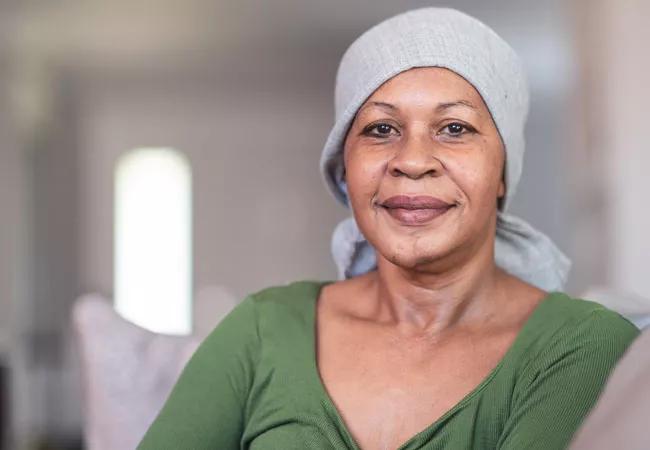Cancer recurrence after vaginal estrogen use is low

In a first-of-its-kind study, Cleveland Clinic researchers show that vaginal estrogen is safe for treatment of genitourinary syndrome of menopause (GSM) in survivors of gynecologic cancer. In the retrospective analysis, adverse events—including cancer recurrence—were rare in women with a history of endometrial, ovarian or cervical cancer who were treated with vaginal estrogen.
Advertisement
Cleveland Clinic is a non-profit academic medical center. Advertising on our site helps support our mission. We do not endorse non-Cleveland Clinic products or services. Policy
“We were inspired to study the safety of vaginal estrogen use in gynecologic cancer survivors after caring for a young woman who had a history of early stage ovarian cancer. Like up to 90% of women with gynecologic cancer, she reported vaginal dryness and sexual dysfunction, which were significantly impacting her quality of life,” says Cleveland Clinic gynecologic oncologist Stephanie Ricci, MD.
When Dr. Ricci and her colleagues checked the medical literature, they were “astounded” to find no published reports of safety and efficacy of vaginal estrogen in gynecologic cancer survivors, despite it being one of the most safe and effective treatments for GSM. Despite results of a randomized trial that demonstrated safety and low risk of recurrence in women with a history of early stage endometrial cancer treated with oral estrogen, many in the medical community have had concerns regarding the possibility that hormonal therapy might increase risk of recurrence in women with a history of gynecologic cancer.
The authors used pharmacy records to identify more than 200 gynecologic cancer survivors treated for GSM with vaginal estrogen at Cleveland Clinic between January 1, 1991 and December 31, 2017. None were undergoing active cancer therapy and all had been found to be disease-free, based on physical examination or imaging, on their most recent cancer surveillance visit.
Of the subjects in the cohort, 127 had a history of endometrial cancer, 62 of cervical cancer and 46 of ovarian cancer. The mean age of the women was 55.5 years and the mean body mass index was 29.2 mg/kg. The majority—80.7%—had not used local or systemic hormone therapy before being diagnosed with cancer.
Advertisement
“With a median follow-up was 80 months, we found that the incidence of cancer recurrence was not increased in women with endometrial, cervical and ovarian cancers,” says Laura Chambers, DO. Rates of recurrence for endometrial, ovarian and cervical cancer were 7.2%, 18.2% and 9.7%, respectively. Of the endometrial cancers that recurred, 2.4% were stage I/II and 4.7% were stage III/IV.
“We also found that the rate of secondary adverse outcomes including development of breast cancer, other secondary cancer and blood clots were very rare.” Regarding adverse events, four patients (1.6%) were diagnosed with venous thromboembolism, four with deep venous thrombosis (1.6%) and two (0.8%) had simultaneous pulmonary emboli. Incidence of strike was 1.2% and of myocardial infarction was 0.8%. Incidence of secondary diagnosis of breast cancer was 1.6%.
Dr. Chambers acknowledges that, because of the retrospective nature of the research, the study may be limited by selection bias. “These women had no evidence of cancer at the time that vaginal estrogen was started, it is conceivable that they are a lower-risk population,” she says. Provider bias may be another limitation, according to Dr. Chambers: “Some physicians may have been more likely to prescribe estrogen to women they thought were low risk.”
The strengths of the analysis are the size of the population and the fact that the patients were treated by a variety of different providers, including gynecologic oncologists, Ob/Gyns and urogynecologists, over a nearly 20-year period.
Advertisement
“We believe that our findings support that it is reasonable to offer vaginal estrogen to gynecologic cancer survivors who are suffering with GSM who have failed conservative treatments including vaginal moisturizers, lubricants and pelvic physical therapy,” says Dr. Ricci. She notes that these patients must be well counseled about the data and the risk:benefit profile.
As the study authors noted in concluding their published report, “prospective studies are needed to further delineate the role of vaginal estrogen in women with GSM and its impact on quality of life in these patients.” The next steps for the researchers at Cleveland Clinic, according to Dr. Ricci may be a collaboration with other institutions to gather a larger dataset from a more heterogeneous cohort of women.
Advertisement
Advertisement

Early results show strong clinical benefit rates

The shifting role of cell therapy and steroids in the relapsed/refractory setting

Radiation therapy helped shrink hand nodules and improve functionality

Standard of care is linked to better outcomes, but disease recurrence and other risk factors often drive alternative approaches

Phase 1 study demonstrates immune response in three quarters of patients with triple-negative breast cancer

Multidisciplinary teams bring pathological and clinical expertise

Genetic variants exist irrespective of family history or other contributing factors

Study shows significantly reduced risk of mortality and disease complications in patients receiving GLP-1 agonists